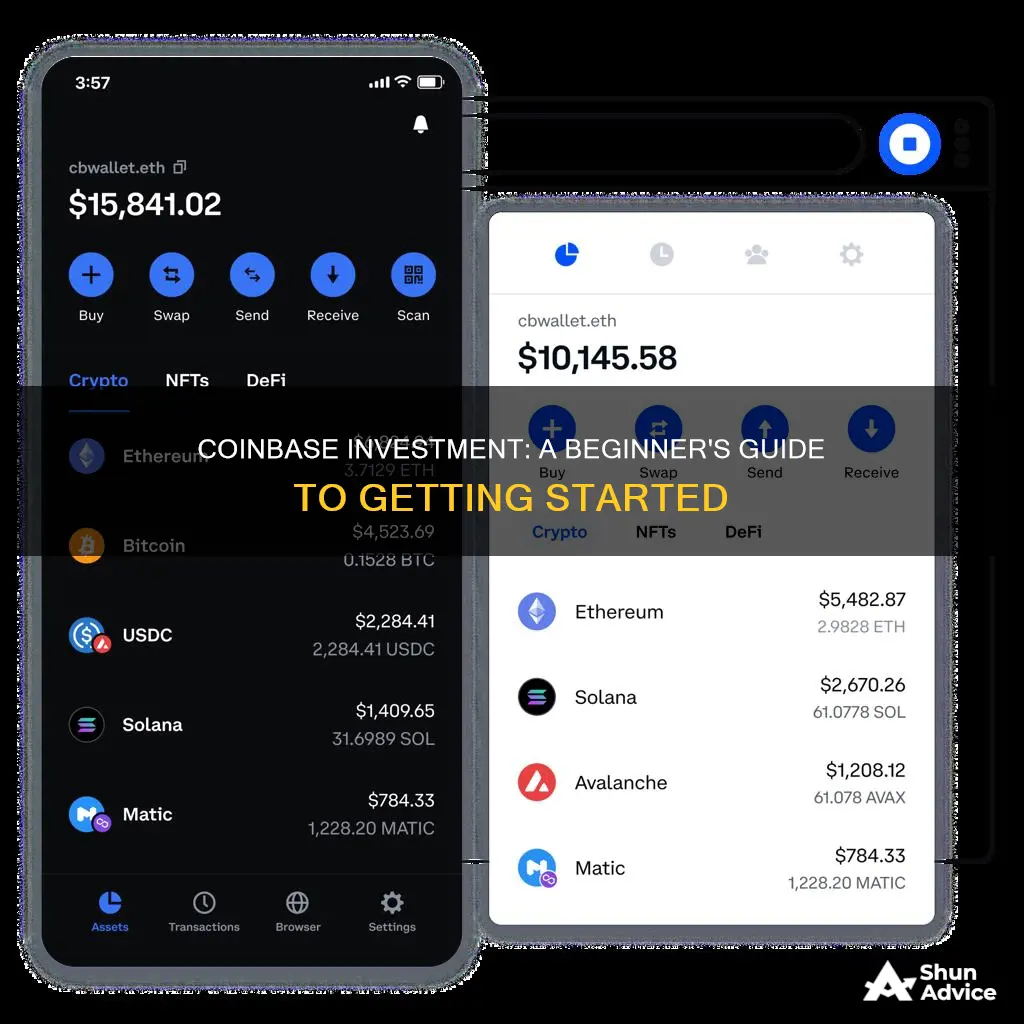
Coinbase is a major cryptocurrency exchange that allows users to buy, sell, and store cryptocurrencies. It is a publicly traded company listed on the Nasdaq exchange under the ticker symbol COIN. Coinbase charges fees for trading via its platform, and these fees are typically higher than the industry average. The company has faced criticism for its poor customer service and lack of transparency around its fee structure. Despite this, Coinbase is a popular choice for crypto trading, with over 110 million verified users. When considering investing in Coinbase, it is important to evaluate the company's financials and determine if the stock aligns with your investment objectives and risk tolerance.
| Characteristics | Values |
|---|---|
| Type of company | Cryptocurrency exchange |
| Headquarters | Wilmington, Delaware |
| Year founded | 2012 |
| Number of employees | 3,400+ |
| Number of tradable assets | 240-250+ |
| Number of users | 110 million+ |
| Available in | 100+ countries |
| Supported cryptocurrencies | Bitcoin, Ethereum, Dogecoin, Ripple, Stellar Lumens, etc. |
| Payment methods | Bank account, debit card, wire transfer, PayPal, Apple Pay, Google Pay |
| Fee structure | Tier-based maker-taker model |
| Security features | 2-factor authentication, cold storage, multiparty computation |
| Customer service | Live chat, social media help, ticketing system |
| Regulatory issues | Charged by SEC for operating as an unregistered securities exchange, broker, and clearing agency |
What You'll Learn

Understand Coinbase's financial history
Coinbase is a major US-based cryptocurrency exchange platform and the largest in the country in terms of trading volume. It was founded in 2012 by Brian Armstrong, a former Airbnb engineer, and Fred Ehrsam, a former Goldman Sachs trader. The company is named after coinbase transactions, which introduce cryptocurrency into circulation in proof-of-work cryptocurrencies.
In its early years, Coinbase secured investments from venture capital firms such as Union Square Ventures and Andreessen Horowitz. It also partnered with companies like Overstock, Dell, Expedia, and PayPal, allowing them to accept bitcoin payments. In 2015, the company launched a US-based bitcoin exchange for professional traders called Coinbase Exchange.
In 2017, Coinbase obtained a license to trade in Ethereum and Litecoin from the New York State Department of Financial Services. However, in the same year, the company faced an insider trading investigation due to price abnormalities on its platform.
In 2020, during the COVID-19 pandemic, Coinbase shifted to a remote-first model and no longer recognised a formal headquarters. The company went public on the Nasdaq exchange in April 2021, with its shares closing at $328.28 on the first day of trading.
In 2022, Coinbase began operations in India but faced setbacks due to regulatory issues. The company also announced layoffs amid a global downturn in cryptocurrencies.
Coinbase has faced regulatory scrutiny, including a $6.5 million settlement in 2021 for reporting misleading information about its trading volumes. In 2023, the US Securities and Exchange Commission (SEC) threatened to sue the company over its cryptocurrency lending product, and in June 2023, the SEC filed a lawsuit alleging that Coinbase had been acting as an unregistered broker since 2019.
Despite these challenges, Coinbase has continued to expand its products and services, including the launch of a crypto derivatives exchange for non-US customers. The company has also reported significant revenue growth, with a nine-fold increase in first-quarter revenue in 2021.
Gordon Ramsay's Bitcoin Adventure: Has He Invested?
You may want to see also

Assess Coinbase's financial reports
Coinbase is a major US-based cryptocurrency exchange and a publicly traded company. Its shares are traded on the Nasdaq exchange under the ticker symbol COIN. Coinbase's unique selling point is that it offers investors exposure to the cryptocurrency market without directly investing in cryptocurrencies.
When assessing Coinbase's financial reports, it is important to consider the company's revenue, earnings, user growth, competition, and management, among other factors. Here are some key aspects to focus on:
Revenue and Earnings:
Analyze Coinbase's income statement, which provides details about its revenue, expenses, and profits. Look for trends in revenue growth or decline over time and compare it with its competitors.
User Growth and Engagement:
Evaluate Coinbase's user base growth and engagement metrics. A growing user base is a positive sign, indicating increasing demand for their platform.
Competition and Market Position:
Research Coinbase's competitors in the cryptocurrency exchange market. Assess their market share, unique offerings, and how they differentiate themselves.
Regulatory and Legal Landscape:
Consider the regulatory environment surrounding cryptocurrencies. Changes in regulations and legal frameworks can impact Coinbase's business operations and financial performance.
Management and Strategic Direction:
Evaluate Coinbase's management team and their strategic decisions. Assess their experience, track record, and ability to adapt to market changes and evolving customer needs.
By thoroughly examining these aspects of Coinbase's financial reports and disclosures, you can gain a deeper understanding of the company's financial health, stability, and potential risks and opportunities. This analysis will help you make a more informed decision about investing in Coinbase stock.
Coin's Long-Term Investment Potential: Worth the Risk?
You may want to see also

Evaluate Coinbase's potential against your investment horizon
Coinbase is a major US-based cryptocurrency exchange that allows anyone with an account to buy, sell, and exchange cryptocurrency. It is a publicly traded company, with its shares opening at $381 on the Nasdaq stock exchange under the ticker symbol COIN. Coinbase stock offers investors exposure to the cryptocurrency market without directly investing in cryptocurrency.
When evaluating Coinbase's potential against your investment horizon, there are a few key considerations to keep in mind. Firstly, it is important to understand the nature of the cryptocurrency market and the potential for volatility. Cryptocurrencies like Bitcoin can experience daily, or even hourly, price volatility. This volatility can impact your investment strategy and may require a long-term perspective to ride out the fluctuations.
Coinbase, as a cryptocurrency exchange, is highly susceptible to changes in demand for cryptocurrencies. Therefore, it is crucial to assess your belief in the future of cryptocurrencies and their potential to become the "future of money". If you think crypto is a passing fad, then investing in a pure-play crypto company like Coinbase may carry more risk.
Additionally, Coinbase has faced some criticism for its relatively high transaction fees and poor customer service. Users have reported a lack of urgency in resolving complaints, even with critical issues. This could impact your confidence in the platform as a long-term investment.
On the other hand, Coinbase has a vast user base of over 110 million verified users as of Q4 2022, and it offers an easy-to-use interface for beginners. It also supports an extensive list of cryptocurrencies and provides passive earning opportunities.
When considering Coinbase's potential, it is essential to evaluate your investment horizon. If you are looking for a short-term investment, the volatility of the cryptocurrency market and the inherent risks associated with a relatively new industry may be significant factors to consider. However, if your investment horizon is long-term, and you believe in the future of cryptocurrencies, then Coinbase could be a viable option, despite the challenges it faces.
Remember, investing in cryptocurrencies is highly risky and speculative, and it is always recommended to consult with a qualified financial professional before making any investment decisions.
Gold Coins: A Smart Investment for Emergencies?
You may want to see also

Research the future of cryptocurrency
The future of cryptocurrency is highly debated. Cryptocurrencies have skyrocketed to mainstream popularity and trillion-dollar valuations, collectively worth more than $1 trillion. Bitcoin, the most prominent cryptocurrency, reached a peak of over $60,000 in November 2021. However, the extreme volatility of the cryptocurrency market has led to a great deal of uncertainty about its future.
Some economic analysts predict a big change in crypto as institutional money enters the market. There is also the possibility of crypto being floated on the Nasdaq, which would further add credibility to blockchain technology and its uses as an alternative to conventional currencies. Some predict that all crypto needs is a verified exchange-traded fund (ETF) to make it easier for people to invest.
On the other hand, critics argue that cryptocurrencies empower criminal groups, terrorist organizations, and rogue states, while also stoking inequality and consuming vast amounts of electricity. The energy-intensive process of Bitcoin mining, for example, now consumes more electricity than many countries, raising concerns about its contribution to climate change.
The rapid rise of cryptocurrencies has also created new challenges for governments and central banks, particularly regarding criminal activity, environmental harm, consumer protection, and financial stability. As a result, regulators have begun crafting rules for this emerging sector, with some governments embracing cryptocurrencies and others banning them outright.
Despite the uncertainty and regulatory challenges, the unique characteristics of cryptocurrencies, such as decentralization, transaction anonymity, and peer-to-peer technology, continue to attract a growing number of investors.
In terms of Coinbase specifically, investing in its stock means betting on the future of cryptocurrency. Coinbase is a major U.S.-based cryptocurrency exchange that went public in 2021, marking a milestone in the world of cryptocurrencies. Its stock gives investors exposure to the cryptocurrency market without directly investing in crypto itself. However, it's important to note that Coinbase's success is highly dependent on the popularity and trading volume of cryptocurrencies. If crypto loses its appeal and users stop exchanging on Coinbase, it could significantly impact the company's revenue. Therefore, when considering investing in Coinbase, it is crucial to have a thorough understanding of the cryptocurrency market and its potential future.
The Future of Pepe Coin: Where to Invest?
You may want to see also

Understand Coinbase's role in the future of crypto
Coinbase is a major US-based cryptocurrency exchange, a platform where crypto assets may be traded. Coinbase stock gives investors exposure to the cryptocurrency market without directly investing in cryptocurrency.
Coinbase shares may be bought and sold on the Nasdaq exchange under the ticker symbol COIN. In 2021, Coinbase went public, marking a milestone as the first pure-play crypto trading company to list on a US exchange.
If you believe there is a future for cryptocurrencies, the next question is whether Coinbase is positioned to capitalize on their popularity. This is where investors might perform an analysis: studying the company's revenue, earnings, user growth, competition, management, and other factors.
Coinbase's stock performance has been mixed since its IPO, and the company has faced legal and regulatory challenges, including a class-action lawsuit and complaints about its campaign finance practices. However, some analysts have upgraded their outlook on Coinbase stock, citing 'matured' business models.
- Coinbase offers a centralized platform for trading cryptocurrencies, which contrasts with the decentralized nature of blockchain technology that underpins crypto. This creates an interesting dynamic for investors who fully believe in the decentralized nature of crypto.
- Coinbase provides a bridge between the traditional financial system and the world of crypto. It offers an on-ramp for institutional investors and individuals seeking exposure to crypto without directly purchasing cryptocurrencies.
- Coinbase's success is tied to the popularity and trading volume of cryptocurrencies. As such, it is susceptible to changes in demand for crypto and could be impacted if users migrate to other exchanges or platforms.
- Coinbase is making efforts to improve the user experience and attract mainstream users. For example, they offer the Coinbase Wallet, which allows users to store their cryptocurrencies and explore decentralized applications.
- Coinbase is subject to regulatory risks and uncertainties, particularly in the US. The lack of clear and well-defined crypto regulations in the US has been seen as a threat to its position as a leader in financial services.
- Coinbase's stock performance is influenced by the broader crypto market and macro-economic conditions. As such, investors should consider the broader economic outlook and regulatory environment when assessing Coinbase's future prospects.
In conclusion, Coinbase plays a significant role in the crypto ecosystem by providing a user-friendly platform for trading cryptocurrencies. Its future success depends on various factors, including user demand, regulatory environment, competition, and its ability to innovate and provide a better user experience.
VVS Coin: A Smart Investment Decision?
You may want to see also
Frequently asked questions
You can buy cryptocurrency on Coinbase by first adding a payment method to your account. Then, select the cryptocurrency you want to buy and enter the amount you want to spend. Review your order and confirm the purchase.
Investing in Coinbase is considered high-risk. Cryptocurrencies are volatile and unregulated, and there is the potential to lose all your money.
You can sign up for a Coinbase account on their website or by downloading the Coinbase app. You will need a valid ID and may be asked for proof of address. You will also need to provide information such as your phone number and the last four digits of your Social Security number.
Coinbase is a major U.S.-based cryptocurrency exchange, a platform where crypto assets may be traded. Coinbase allows users to buy, sell, and store various cryptocurrencies.







